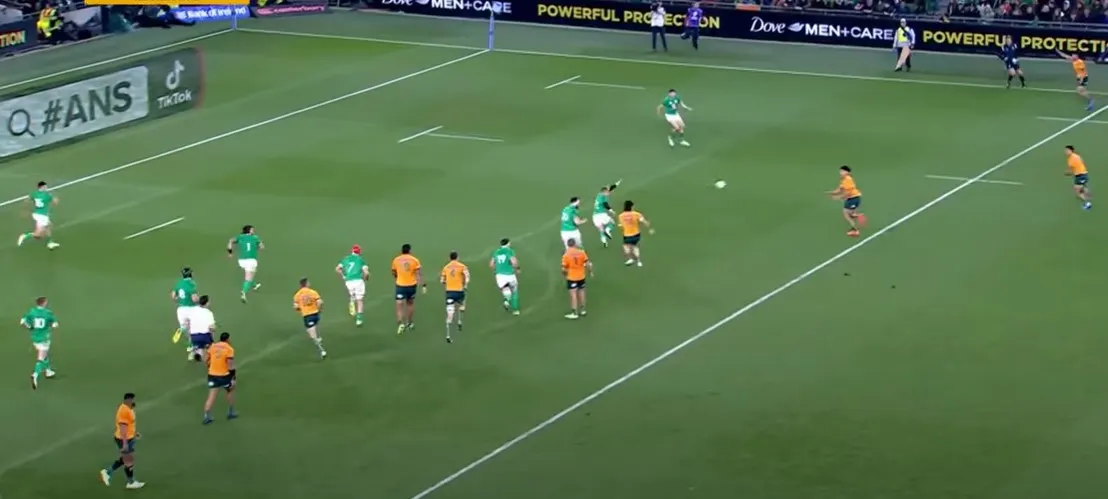The Laws of Rugby -v- The Rules of American Football
Nov 07, 2022
The Laws of Rugby -v- The Rules of American Football
This is the first in a series of discussions about the Laws of Rugby - where better to start than with a broad comparison between the arcane laws of Rugby and the Rules of American Football. Join us in this upcoming series of discussions and keep your eyes peeled for the odd free gift.
It is amazing to think that American Football (or Gridiron to somee, had its origins in the game of Rugby.
Rugby is said to popularly date back to 1823, when, at Rugby School, in England, a young gentlemen by hte name of William Webb Ellis, is said by popular folklore, to have picked up the soccer ball and run with it to the goals, and so they say, Rugby was born.
Inerestingly enough, there were originally no rules or laws even no unmpires. The folklore says that if there was a dispute as to a possession or foul play, the two captains would endeavour to sort it out in a gentlemanly way. If they could not they "referred"the dispute to an independent arbiter on the sideline, such as the local vicar, headmaster or policema, so hence the term "referee" and not "umpire".
Believe me? ..Take it or leave it, but it's a good yarn.
Anyway, the entire lists of the laws (rules?) are on the International Rugby Board website.
For the rookies, here is your short list of them.
1. Protection
There are no shoulder pads or helmets in Rugby.
2. You Have to Pass backwards to run forwards!
The ball must be pitched backwards to your teammates. No forward passes. A team can pitch the ball back and forth to each other as many times as they wish.
3. Run at the Spaces, Not at the Faces
There is no blocking to assist your runner. He needs to find a hole and run through it, kick over it, run around the tackler or pass it to someone else who will have a go.
4. Everyone gets the chance to shine.
Everyone runs with the ball and tackles equally. Unlike American gridiron football where two or three blokess get all the glory and the rest of the team is never given the opportunity to prove themselves and run for a score, every player on the rugby field will run with the ball and tackle more than 20 times a game. If you were an offensive lineman and never ran the ball and never tackled, this game is for you!
When a set dead-ball scrum is formed, that is when the team will get in their set positions, but shortly after that when mass chaos breaks out, all players will run and tackle with the ball.
5. You will Learn the Eccentricities of the Ruck and Maul
When you are tackled you have one second to let go of the ball and purposely “fumble” the ball (backwards). Don’t touch it again until you are up from the pile and standing on your feet again.
When you tackle someone, you can’t pick up the ruck ball until you are on your feet. This is one of the most called penalties on new players. You must be standing up to pick up the ball. You cannot dive on a loose ball.
6. Offside Penalties
When you are defending, and a tackled player is put to the ground, you must make sure you are on your side of the scrumage line before you engage in any physical contact with the other team. This is known as "coming through the gate", and it is also called offside and is one of the most called penalties for all levels of players.
It usually happens when a defensive player is chasing down a runner from behind. The defensive player must run around the ruck and enter from the other side to give contact on the ruck (his own players) and must be able to support his body weight (ie cannot just collapse onto the ruck).
There is a often very big yardage penalty if you get caught not being on sides on a loose ruck pile. Most penalties will draw a yardage penalty depending on where the ball crosses the sideline downfield after a penalty punt, or even worse, if the kicker is within range of the poles, he can kick a place kick and earn his team 3 points.
7. 15 Brave and Hearty Men
The game will have 15 players from each team taking the field. There are up to 8 substitutions on the sideline (dugout) and once a player is replaced in normal play, he cannot come back on (very limited exceptions, such as injury).
Most of the starting 15 will play the full 80 minutes, andn up to 8 can be replaced usually in the last 15 to 20 minutes> These reserves are usually known as the "finishers". Some purists think that this should not be allowed as Rugby is, very much, a game that is a series of contests - the kick off, the ruck, the scrum and more, the contestibility of high kicks etc, and some believe that another contest that is equally important is the management of the fatigue factor.
8. Going backward or sideways to Go Forward
When your teammate pitches the ball to you as you are running down the field, and you accidentally drop the ball, it is called a knock on (any form of propelling the ball forward out of the hands).
If it accidental that will earn the opposition a scrum, with the right to put the ball in, giving them an advantage - if it is deliberate, it will earn them a penalty kick and may even earn you a red or yellow card (yellow = 10 minutes in the "Sin Bin') and Red meaning that your game is over for the day and there may even be a short suspension waiting for you around the corner.
The other team will get the ball automatically right there for their possession. As you can see, this is the kiss of death when you drop or knock on the ball deep in your own territory by their scoring end zone. This is why we run so many ball-handling drills in practice, to cut down on these penalties.
9. No Touchdowns - Just Tries
It's odd, but in football you get a touchdown by not having to actually touch it down, but in Rugby you get one (called a "Try) when you have actually touched it down with positive downward pressure (not dropping) it when what you actually did was way more than just trying, and, by the way "trying "successfully will earn your team 5 points. If the kicker converts it (just like in football) it is another 2, the only difference being that the "conversion"attempt must be a place kick taken back in a straight line from where the try was scored. So if the try was 1 yard in from the corner the kick will start from one yard in from the sideline.
10. Never a Down, but Often Out (on your feet).
There are no downs in rugby like there are football. An offensive team may have the ball for 20 phases or downs in a row, if they can keep winning the ruck contest and push over the tackled player to win the ball and regain possession. It is very important to always be in support and chasing after your ball carrier at all times. When your offensive player is tackled and there are four offensive players running right behind the ball carrier, they should no doubt be able to push over the two or three defensive players at the tackle area or the ruck. This brings in that good old fatigue factor.
On the other side of the coin, if no offensive players are in support and the ball carrier is tackled, the defence will simply step over the ball and the ball carrier to pick up the loose ball. The offensive player must release the ball in one second. The defensive team will just pick it up and run the other way if no offensive support is right there. It is very important to be in support and have four players right behind a ball carrier. One, you will be there for a pitch-pass; and two, you are there for a ruck over to win the ball.
If you remember these laws (rules), you will be ready to play a game!
However, as a famous Welsh International player was famous for saying ... "It helps if you don't know the laws ... and you'll be on the same wavelength as the referee..!
The best way to learn the intricacies of the beautiful game, is just go out and play. Your team mates will help you and you will learn from your mistakes, often very quickly if you get caught in the middle of hte ruck. Play like there is no tomorrow, but remember, one of my favourite Rugby sayings .."...there is always next week".







